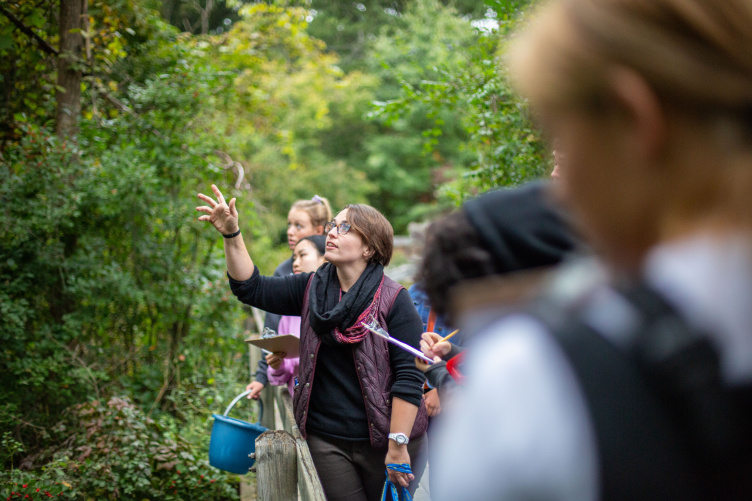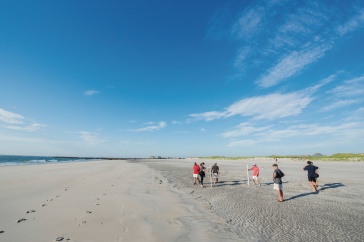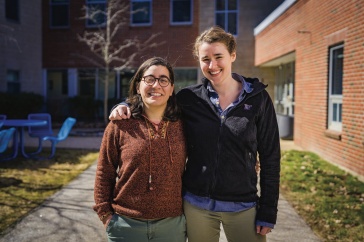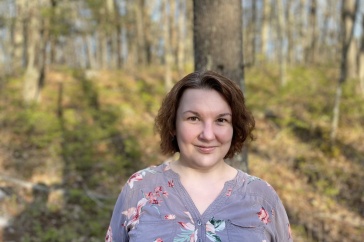
Kiley Remiszewski knew her work was important, but she didn’t realize just how important until she began teaching Earth systems science to high schoolers at Concord Academy in Massachusetts.
The doctoral candidate’s dissertation connects geochemistry — specifically, fungal impacts on weathering — with science education and tackles how to best teach complex systems to K-12 students.
If anything, these students make her even more motivated to teach and learn.
“These students are really engaged, and even if they’re not all excited about science, they’re really driven to learn, which is pretty amazing," Remiszewski says. "They can ask some really great questions in class, which makes me want to find out more; there’s so much we don’t know, which is really exciting.”
In terms of her own research, Remiszewski has finished her coursework, proposal defense and comprehensive exams and is working on the second chapter of her dissertation. It’s a lot, being a teacher and a student simultaneously, but she’s found they feed one another well. She especially hopes to reach students who didn’t always think they liked science.
It’s a lot, being a teacher and a student simultaneously, but she’s found they feed one another well.
“In high school, I didn’t love science either. It was physics and chemistry and biology. But Earth and environmental science is still science — you can be good at science without being good at physics. You can have an interest in humans and communities and activism and still be involved with science,” she explains.
Remiszewski grew up in Hampton Falls, New Hampshire, and earned her undergraduate degree in renewable resource management at McGill University. It was her mom, also a science teacher, who got Remiszewski interested in UNH by telling her about research that Julia Bryce, professor of Earth sciences, was doing. Remiszewski's mother had been exposed to Bryce's work via the Research Experience for Teachers in Engineering program.
Remiszewski also liked UNH’s Natural Resources & Earth Systems Science (NRESS) program because it encouraged interdisciplinary research and collaboration across fields. It was the kind of science that moved beyond lab work and could connect very clearly to people. She applied to the master’s program and, after a year, stepped on the doctoral track. During her time at UNH, she did a great deal of work with the Joan and James Leitzel Center for Mathematics, Science and Engineering Education, which is committed to education and outreach.
When high school lets out for summer, Remiszewski becomes a full-time graduate student again, researching mycorrhizal fungi and its impact on weathering in different environmental conditions, which, even with a classroom of students, is still very important to her.
“I’m still really, deeply curious about mycorrhizal fungi. I want to learn more about these symbiotic fungi and how they might be helping trees get essential nutrients from rocks and minerals. I’m still fascinated by that system, and I feel like if we get a better understanding of how these fungi work, it will help us make better predictions for ecosystem health in the future,” she says.
Remiszewski plans to graduate at the end of the summer. Afterward, whatever she does must tie her two loves of science and education together. Perhaps she’ll continue to teach or perhaps she’ll work for an institution like the Leitzel Center. She loves the idea of building stronger collaborations between high schools and research institutions so teachers can better access research and instrumentation materials and help the next generation become better thinkers.
“Taking the time to train students to think critically and be critical consumers of media and information is really important," she says. "If we can figure out how to better teach them, we can help them be better thinkers."
Learn more about UNH's NRESS doctoral program.
-
Written By:
Kristen Melamed | Graduate Admissions



















































